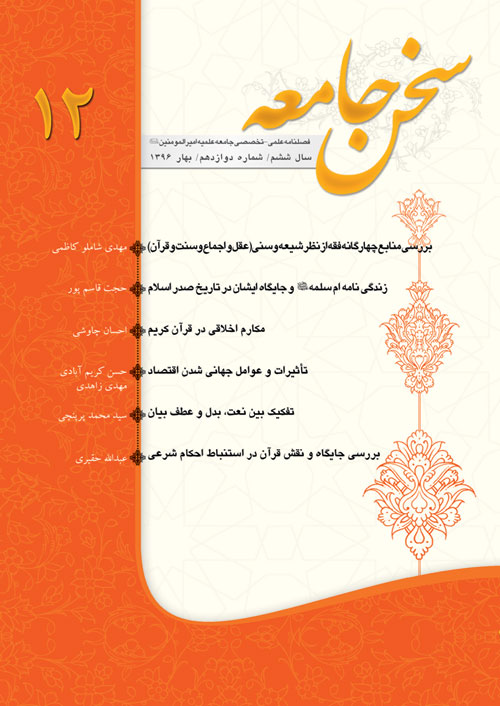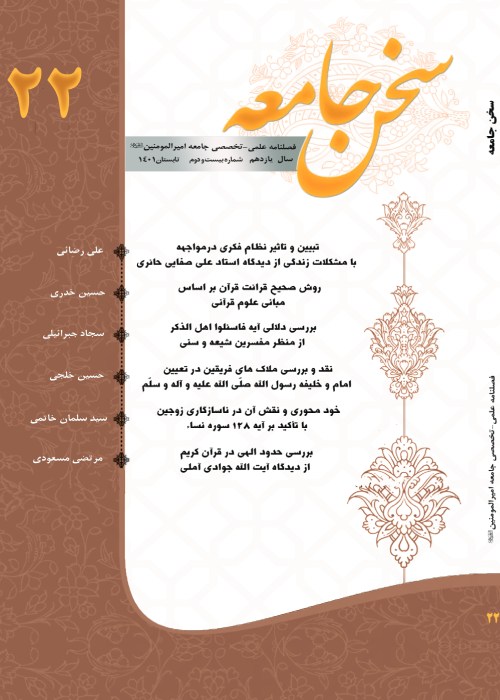فهرست مطالب

فصلنامه سخن جامعه
پیاپی 12 (بهار 1396)
- تاریخ انتشار: 1396/03/13
- تعداد عناوین: 7
-
صفحه 5
-
صفحه 31
-
صفحه 57
-
صفحه 75
-
Page 7In jurisprudential and principled issues, the method of jurisprudence deduction is a problem that is posited between Shiite and Sunni, in which there are differences of opinion and has a significant effect on the sentences deduction method. The Shiite sees a particular issue as authenticity and Sunni believes in an issue against it or vice versa! The research is carried out with library method and as far as possible, it has been tried to use reliable sources, such as al-Kafi, and al-Mahasen and Ajvad al-Taqrirat. In these sources of jurisprudence, the most important of them are Quran, Sunnah, reason and consensus. In each of these discussions, I try to cover each one at least briefly to the point where the word does not go out of boredom. In this paper, the authority of the Quran is addressed, albeit through rational and narrative reasons. In some cases, I have not found reason except thought and reason for research hypotheses. In this paper, the authenticity of the Sunnah and the reasons to prove infallibility will be address. Also the Sunni view of the Sunnah of the Companions and the definition of the Companions and rejection of them is also brought. In the discussion of reason, I have also discussed it very briefly and on the consensus, there is also a very beautiful debate about the authority of consensus either independently or through other resources that I refer to it in the text.Keywords: Quran, Sunnah, reason, consensus, Shia, Sunni
-
Page 21As mentioned, the subject of this paper is the position and influence of Umm Salmah in early Islamic history and her personality life. In this regard, we first introduce and recognize her unique features and whether she was trusted to the Ahl al-Bayt (PBUH) or not and then the role of this honorable lady from the beginning of the Prophets prophecy until the end of her life and whether she had a religious or political orientation after the death of Prophet Muhammad (PBUH & HP) or not are discussed. Unfortunately, in history, her own person has not be addressed as it should be, for the reasons that are mentioned at the end of the paper and very little of her news reached us. Thats why I decided to do some research on this subject, so maybe I could get some useful news from her. Because the subject of this paper is historical, and reason and rational reasoning often do not exist in the historical content and most of the arguments and analyzes are narrative, and this also requires a large study of historical books, I did a fairly large study as long as I was able to do, so I can do an analysis, but no definitive analysis has been made due to the limited time and resources. Meanwhile, the method of research on this subject is library method.Keywords: Umm Salamah, the holy Prophet, Medina, Early Islam
-
Page 31The luminous and holy school of Islam, which as the ultimate divine law, is a comprehensive and complete religion, knows the differentiation between human and other beings, its enjoyment from power of intelligence and intellect, although they are very much in common and on the basis of distinction, expresses the sentences and rules such as individual and social sentences. and even states the manner in which human adhere to the school behave with its surroundings. From the point of view of Islam, the guarantee of the societys felicity which is the conquest of the peaks of ideals and goals, depends on the happiness of each member of the society and because of this, the sacred law of Islam relies heavily on the principles of morality and social relations. This paper which has been prepared and written in the form of interpretive studies and with the research on the moral issues of the Holy Quran, has presented a brief research and account of the moral and moral principles set forth in the Holy Quran which is known as descriptive ethics, by expressing a comprehensive definition of the word ethics and points out the interpretative points and definitions of moral traits among the explanations of related verses. At the same time, it should be noted that the opposite of good ethic morality and the moral virtues mentioned in the paper are known as moral vices, considering the general meaning of ethics and based on division of ethics into good and vice ethics. For example, against the virtue such as knowledge, there is a vice such as ignorance.Keywords: Ethics, Islam, Quran, Individual, Social Interactions, happiness plan, Social Responsibilities
-
Page 57This article discusses the globalization of the economy in whichthere are various theories and one of the requirements for discussing the globalization of the economy and its effect and factors is that we first recognize and understand the phenomenon of globalization; because the phenomenon of globalization has various causes and effects, one of its effects is on the economy and among other kinds of it, we have globalization of culture or globalization of politics, and so on, but in this article, we first discuss the phenomenon of globalization and then the globalization of the economy and its causes and effects. In this paper, we will answer the question of whether globalization of the economy can causes the economic context growth? Globalization is one of the issues that its background, although not much in the past, has many effects and results and economists and scholars have made a lot of comments about it. In this paper, we have tried to explain the most important comments. And in the end of the discussion, we will conclude whether the effects of this discussion will create economic prosperity or not, with the study of its positive and negative causes and consequences?Keywords: globalization, economy, free trade, international, investment, institutionalization
-
Page 75The subject of the paper is the separation between praise, substitute and apposition. This research was initially initiated by reviewing the syntactic books and then the key issues were chosen and the paper is presented after sorting out the content. The paper is divided into two sections of the explanations and separations. in explanations section, we state that the praise is a function that completes its respective and divide it in terms of meaning into two real and causal forms and in terms of word into singular, sentence, and quasi-sentence. In the explanation of praise, we say that the praise is a function that the speakers purpose is to sentence and the purpose of praise is to Strengthen the sentence, it is divided into four kinds of the whole of the whole, a part of the whole, inclusion, and incompatible. In expressing the apposition, we also say that the apposition reveals the meaning of respective by explaining the self essence like the praise. Then, in separations section, we will outline the most fundamental difference between the praise and appositive that the praise does not meant to sentence unlike the appositive and that the appositive will strengthen the sentence, but the praise will not. In the expression of the difference between the praise and apposition, we said that the praise explains the praised by the essence of praised itself. But in the expression of the difference between the appositive and apposite, we said that the appositive means to sentence, but apposition does not so and that the appositive will strengthen the sentence, but apposition will not.Keywords: praise, appositive, apposition, separation of praise, appositive, separation of praise, apposition, separation of appositive, apposition
-
Page 85One of the most basic issues that arise in jurisprudence and the interpretation of jurisprudential rulings and sentences is recognizing the reliable sources in this regard and determining the role and position and the way of utilizing them for proper understanding and the exact discovery of divine sentences. Obviously, the lack of proper knowledge of these sources and the lack of effective and correct principles in dealing with them have a direct effect on the inference of the jurisprudent and distances him from the exact discovery of sentences and cause him not having the necessary strength and rigidity in the sentence and judgment, and getting into a variety of conflicts and mistakes and the existence of these scientific disputes and nodes expresses the importance of having sound and firm principles and our increasing need to review scientific and practical frameworks of how to infer and deal with conflicts and problems. We will also discuss and review the Divine Book and draw the position and role of its lightening versus in interfering religious rules and resolving conflicts and solving problems, while a logical review and taking advantage of strong reasons from the Quran and the Sunnah of the Prophet and the Imams (Peace Be Upon Them), consistent with the title of the paper.Keywords: Quran, principles of jurisprudence, inference of religious laws, place of verses, source


